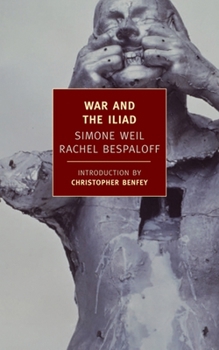War and the Iliad
Select Format
Select Condition 
Book Overview
Simone Weil's The Iliad, or the Poem of Force is one of her most celebrated works an inspired analysis of Homer's epic that presents a nightmare vision of combat as a machine in which all humanity is... This description may be from another edition of this product.
Format:Paperback
Language:English
ISBN:1590171454
ISBN13:9781590171455
Release Date:March 2005
Publisher:New York Review of Books
Length:152 Pages
Weight:0.40 lbs.
Dimensions:0.4" x 5.1" x 7.8"
Related Subjects
Ancient Ancient & Classical Literature Criticism & Theory Diplomacy Education & Reference Fantasy Epics Greece Greek History History & Criticism Humanities Literary Criticism Literary Criticism & Collections Literature Medieval Movements & Periods Poetry Politics & Government Religion & SpiritualityCustomer Reviews
3 ratings
Sublime Masterpiece - Not the best translation
Published by Thriftbooks.com User , 17 years ago
Simone Weil was one of the transcendent geniuses of our time. The archetypal intellectual/activist - the clarity of her insight and the depth and weight of her oeuvre is remarkable, incredible for anyone - no less someone in their twenties and early thirties. A brilliant comet of a being, intensely engaged in the vortex of social change, yet seen by her contemporaries only from a distance - she died at a mere 34! Weil mastered Ancient Greek in her teens and used to correspond with her brother in Attic script. She even contemplated a translation of the Iliad, which she believed to be "the purest mirror of the human condition". Her writings on Greek thought, luminous, eloquent, and profound are collected in a svelte volume, 'Intimations of Christianity Among the Ancient Greeks' Routledge & Kegan Paul, 1957. Wonderful as it is to have these works in English in one volume - the best translation of her noted masterpiece, 'The Iliad, the Poem of Force' is not to be found here - nor is it to be found in NYRB's reissue of the original English translation by Mary McCarthy. The translation which, to my ear, really captures the honed edge of Weil's prose is Holoka's 'The Iliad or the Poem of Force: A Critical Edition'. New York and Frankfort on Main, Peter Lang, 2003. Compare the rendering of famous first lines of the 26 page essay: McCarthy: "The true hero, the true subject matter, the center of the Iliad is force. Force employed by man, force that enslaves man, force before which man's flesh shrinks away". Holoka: "The true hero, the true subject matter, the center of the Iliad is force. The force that men wield, the force that subdues men, in the face of which human flesh shrinks back".
The Hedgehog and the Fox
Published by Thriftbooks.com User , 17 years ago
Mary McCarthy translated both of these great essays on the ILIAD written during the Occupation by two of France's leading intellectuals with the intention of publishing them both together, but entanglements with the estate of Simone Weil made this impossible until now. The great Greek literary works about warfare and civilization were much on the minds of French intellectuals during World War II, and these two essays are among the most remarkable fruits of that thematic obsession. Homer's literary inheritor, the seventh-century BCE poet Archilochus, wrote, "The fox knows many tricks, the hedgehog only one, but it is a good one." The great twentieth-century philosopher Isaiah Berlin thus grouped the preeminent figures of Western culture into the categories of "foxes" and "hedgehogs." In her essay here, Weil shows herself to be a hedgehog, pursuing one theme relentlessly and obsessively but exceptionally persuasively. In pursuit of her argument that the ILIAD is a poem about force she herself reenacts such violence upon the characters, stripping the characters of their names (such that Andromache becomes "the wife," Priam "the suppliant") in order to make her point that they are de-humanized by the processes of war. Even with this in mind, hopwever, it would be hard to think of a more encompassing or poignant reading of the poem, though Rachel Bespaloff, who apparently read Weil's piece while writing her own study of the ILIAD and altered her argument to accommodate Weil's, may well out-do her. Bespaloff is intellectually a fox, pursuing many ideas and themes with real grace and with Weil's very historically and culturally broad sense of scope; her argument is absolutely remarkable, and shows that, like Weil, she has a strong command of the poem's ethical problems as well as of its richness. As icing on the cake, NYRB also appends the novelist Hermann Broch's own fine essay on Bespaloff's piece. Anyone who has read the ILIAD carefully will find much meat here, even sixty years after the original essays were written.
Historic Rescue from the Sands of Time
Published by Thriftbooks.com User , 19 years ago
Besides being thankful to the New York Review of Books for publishing some of the most intelligent and expansive literary criticism around, we can now be grateful for one more gift from the series of New York Review Classics. This one, two essays ostensibly on the Iliad by Simone Weil and Rachel Bespaloff, attains the very special pantheon of a glorious literary event. Both pieces were written by women who were Jewish intellectuals forced to flee France on the cusp of the Second World War and were composed in that climate of national upheaval. In writing about the greatest war epic in Western literature, they were able-each in her own way-to cast a reflection on her own time and the devasting changes that the threat of war was effecting. Needless to say, this creates an urgency and immediacy to their writing that goes beyond the literary. These are not aloof reflections on an ancient relic but the purest example of writing on life and death as a matter of life and death. The publishing of the the pairing of these two pieces is an act of heroic recovery, the best example of why writing matters.






